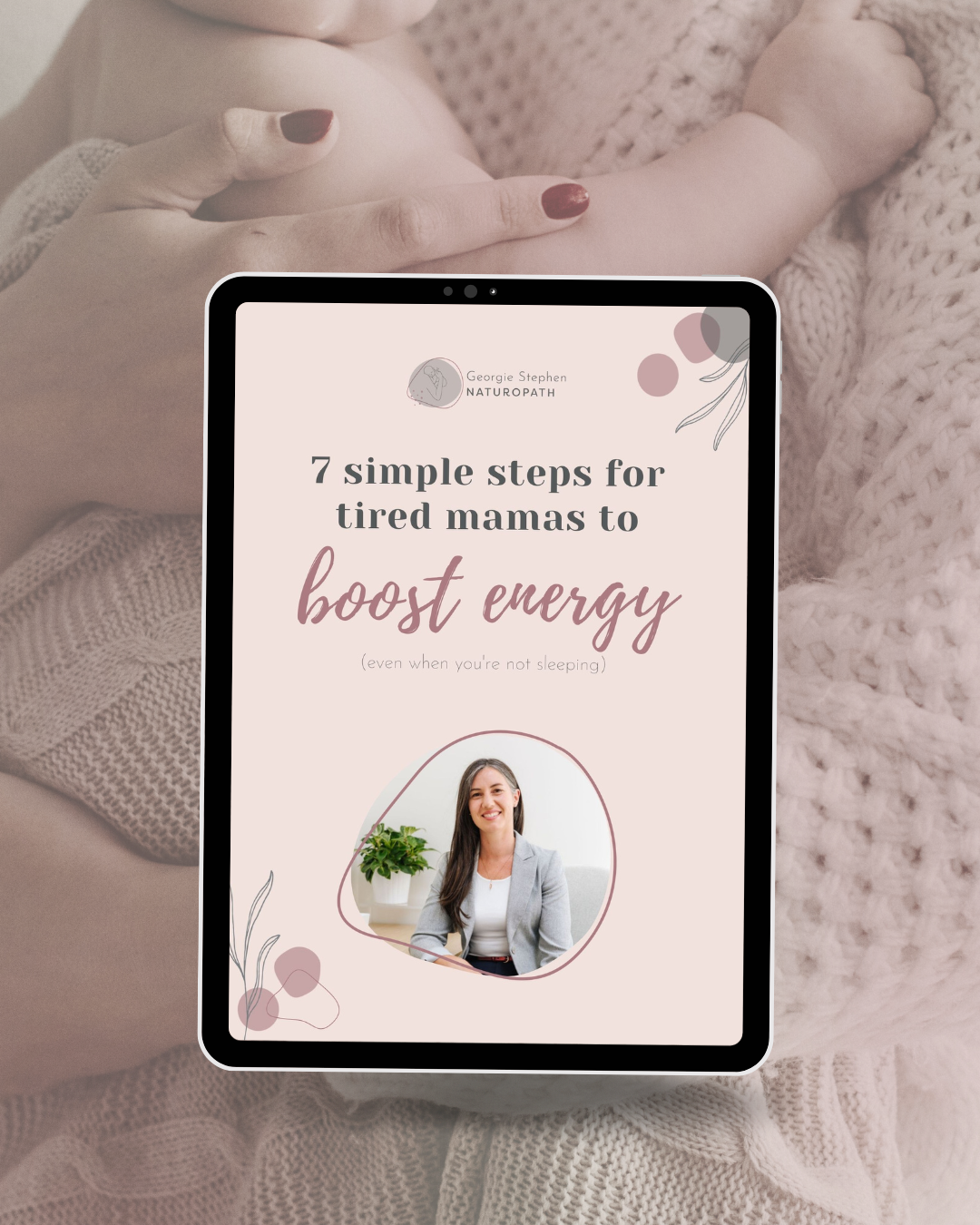There is currently an epidemic of exhausted mothers who are dragging themselves through motherhood totally burnt out, run down, and depleted. I work with them every week in clinic and talk to them every day on Instagram through my posts. Exhaustion in motherhood is so common that it’s often mistaken to be a normal part of being a mother, when in fact it is far from normal.
A huge part of the mission behind my work is to change the way that mothers care for themselves in early motherhood, and this begins with them understanding that feeling this way is not normal. There are mostly likely multiple underlying imbalances resulting in exhaustion, brain fog, irritability, and the many other difficult experiences too many mothers accept as their fate.
In this article I’m exploring what exactly postnatal depletion is and how you can understand whether you might have it, as well as differentiating between the exhaustion depletion versus sleep deprivation.
There are countless steps we can take to help you reclaim your energy and resilience, and help you find the joy in motherhood.
Disclaimer:
The information provided in this blog is for your personal or other non-commercial, educational purposes. It should not be considered as medical or professional advice. We recommend you consult with a GP or other healthcare professional before taking or omitting to take any action based on this blog. While the author uses best endeavours to provide accurate and true content, the author makes no guarantees or promises and assumes no liability regarding the accuracy, reliability or completeness of the information presented. The information, opinions, and recommendations presented in this blog are for general information only and any reliance on the information provided in this blog is done at your own risk.
What is postnatal depletion?
Postnatal depletion is the depletion and associated symptoms that we see in many mothers after they go through pregnancy, birth, and postpartum. Personally, I like to use the term postpartum depletion (PPD) instead of postnatal depletion, since technically postpartum refers to the mothers health while postnatal refers to the baby’s health.
PPD can occur in first time mothers, second time mums, or after any subsequent pregnancy. It can show up in the first few months after birth, but for many mothers it takes longer to become apparent and can occur even many years after birth.
Although mothers have been experiencing by postpartum depletion for many years, especially in more recent decades of modern mothering, the term itself has only been recently recognised (work that has been pioneered by Dr Oscar Serrallach and his book The Postnatal Depletion Cure). It is considered a syndrome, which is a group of signs and symptoms that often occur together, but which aren’t strictly defined by a common set of diagnostic criteria like a disease or condition is.
PPD is essentially the depletion caused by nutritional deficiencies, hormone shifts, and psychosocial factors relating to becoming a mother.
Dr Serrallach has estimated that around 50% of mothers will experience some degree of postpartum depletion.
Do you have postpartum depletion?
Fatigue and exhaustion are often the biggest reason that mothers begin to ask the question, ‘do I have postpartum depletion?’
But many mothers wonder whether their fatigue is just a normal part of motherhood, or due to ongoing sleep deprivation, or whether it is in fact postpartum depletion.
Common signs & symptoms
Due to the complex underlying pathology and biochemical imbalances driving PPD, the signs and symptoms of depletion are varied and span across many body systems.
The most common ones include:
- Fatigue & exhaustion that is not relieved by a good nights’ sleep
- Baby brain, brain fog, and trouble with memory and concentration
- Waking each morning feeling tired or unrefreshed
- Mood changes like low mood, mood swings, teariness, irritability, hyper vigilance, or anxiety
- Feeling wired but tired, and having difficulty falling asleep even though exhausted
- Other sleep troubles that are unrelated to the waking of a child, like trouble falling or staying asleep
- Sensitivity to bright light or loud noises
- A sense of overwhelm, frustration or of not coping
- Loss or low libido
Downstream signs and symptoms can arise as a result of the ongoing depletion and underlying nutrient deficiencies or biochemical imbalances, and may affect systems like the digestive system, reproductive system and the menstrual cycle, the thyroid or adrenal glands, or skin health.
Is it *really* postpartum depletion?
Because postpartum depletion is a syndrome, this means it is a diagnosis of exclusion – all other possible causes must be investigated and ruled out before coming to this conclusion.
Because of the increasing awareness of and discussion about postpartum depletion, which is long overdue and much-needed, many mothers wonder whether their fatigue and exhaustion is actually depletion.
But before self-diagnosing, you must have a proper postpartum assessment completed with full blood work to rule out any other underlying cause, as the treatment and support strategies need to be tailored to the right factors.
Related blog: 5 Blood tests every tired mum needs postpartum
Am I just sleep deprived or do I have postpartum depletion?
The answer to this is not straightforward because there is a large crossover between the signs and symptoms of the two, including things like fatigue, exhaustion, brain fog, trouble concentrating, poor memory, irritability, short temper, or mood changes. These could come up with either.
In my view these two states exist as different points on the same continuum.
In many cases chronic sleep deprivation precedes postpartum depletion, although not always. Some mothers can end up depleted without significantly broken sleep. And chronic broken sleep doesn’t mean you’ll definitely end up depleted.
Some questions you can ask yourself to understand this more include:
- Is my fatigue alleviated at least in part by a good night’s sleep? (but, of course, for many of us the answer to this is unclear because the sleep broken sleep is unrelenting)
- How do you feel how does your energy feel after a cup of coffee or coffee or something else caffeinated? Did your energy lift or is your fatigue largely unchanged?
- Have you had any blood work done postpartum? This might show signs related to depletion, like nutrient deficiencies or hormone imbalances.
- Or do you have any other signs and symptoms that point more toward depletion, for example, low libido or hair loss or sleep disturbances?
What to do next
The healing process for postpartum depletion usually occurs in multiple stages and can take many months, which accounts for the complex nature of the depletion.
It involves restoring and rebuilding not only physical health, but also emotional health, building social support, and exploring the spiritual aspects of becoming and being a mother.
I always advocate strongly for exhausted mothers to get some blood work done so that things like thyroid disorders or iron deficiency aren’t overlooked.
After this, the first step involves building a strong foundation from which good health can flourish. This foundation of health is sometimes referred to as the pillars of health and is defined differently by different people. But in the context of early motherhood I consider these 6 pillars:
- Sleep & rest
- Food & nutrition
- Movement & exercise
- Purpose & joy from life
- Environment & the home
- Relationships
Each mother is unique and will do best with a personalised healing plan.
Other steps might include:
- Rebuilding micronutrient stores and correcting deficiencies
- Assessing and balancing hormones
- Working with a counsellor or psychologist
- Optimising sleep quality & rest
- Finding gentle & enjoyable movement that can be done regularly
- Exploring relaxation practices that can calm the nervous system
- Creating a healthy home & environment
- Building social support & working on relationships
- Examining social & cultural beliefs
- Rediscovering the self & new identity as mother
Moving through each of these steps or knowing which steps are most relevant to you can be tricky to navigate on your own. It is really helpful to have a little bit of help and guidance along the healing path to navigate which steps are most relevant for where you’re at right now.
I support mothers 1:1 in my online clinical practice to overcome postpartum depletion, rebuild their resilience and rediscover themselves after the early months and years of motherhood. You can learn more about my services here or book an appointment here.
Disclaimer:
The information provided in this blog is for your personal or other non-commercial, educational purposes. It should not be considered as medical or professional advice. We recommend you consult with a GP or other healthcare professional before taking or omitting to take any action based on this blog. While the author uses best endeavours to provide accurate and true content, the author makes no guarantees or promises and assumes no liability regarding the accuracy, reliability or completeness of the information presented. The information, opinions, and recommendations presented in this blog are for general information only and any reliance on the information provided in this blog is done at your own risk.
// FREE GUIDE //
7 simple steps for tired mamas to boost energy
(even when you’re not sleeping)



0 Comments